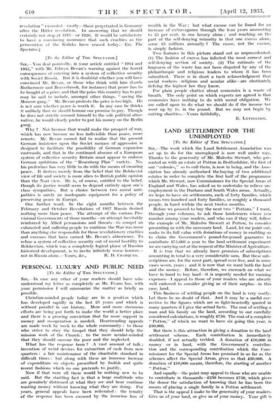[To the Editor of THE SPECTATOR.] SIR,—You deal pointedly, in
your article entitled " 1914 and 1935," with Mr. Elwyn Bevan's warning against the horrid consequences of entering into a system of collective security with Soviet Russia. But it is doubtful whether you will have convinced Mr. Bevan, or those who think with him (Lords Rotherruere and Beaverbrook, for instance) that peace has to be bought at a price, and that the price this country has to pay may be said to include, amongst other things, " saving the Moscow gang." Mr. Bevan protests the price is too high. He is not sure whether peace is worth it. In any case he thinks it unlikely that we should honour our promise to pay. Though he does not strictly commit himself to the sole political alter- native, he would clearly prefer to put his money on the Berlin gang.
Why ? Not because that would make the prospect of war, which has now become no less indivisible than peace, more remote. Mr. Bevan cannot fail to realize that the present German insistence upon the Soviet menace of aggression is designed to facilitate the possibility of German expansion eastwards, and that in the continued absence of a European system of collective security Britain must appear to endorse German ambitions of the Rosenberg Plan " variety. No, his preference has very little to do with the means of ensuring peace. It derives merely from the belief that the Bolshevist view of life and society is more alien to British public opinion than the Nazi view. He is, of course, entitled to the belief, though its justice would seem to depend entirely upon one's class sympathies. But a choice between two moral anti- pathies is surely an inadeqOate equipment for a policy of preserving peace in Europe.
One further word. In the eight months between the February and October Revolutions of 1917 Russia desired nothing more than peace. The attempt of the various Pro- visional Governments of those months—an attempt inevitably reinforced by Allied persuasions and threats—to compel an exhausted and suffering people to continue the War was more than anything else responsible for those revolutionary cruelties and excesses that have earned Mr. Bevan's abhorrence. To refuse a system of collective security out of moral hostility to Bolshevism, which was a completely logical phase of Russian historical development, is to invite infinitely worse horrors— not in Russia alone.—Yours, &c., R. D. CHARQUES.


















































 Previous page
Previous page